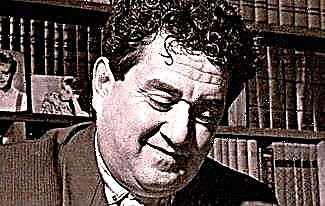Confucius (approx. His ideas had a huge impact on the life of China and East Asia, becoming the basis of the philosophical system - Confucianism. He founded the first university and systematized the chronicles compiled in various principalities.
Confucius's teachings on the norms of behavior of rulers, officials, soldiers and peasants spread in China at an incredibly fast pace. He is considered the first professional teacher of the Celestial Empire.

Over time, Confucianism achieved the status of a state ideology, which survived until the early 20th century, second only to Buddhism and Taoism. This led to the exaltation of the philosopher and his inclusion in the religious pantheon.
There are many interesting facts in the biography of Confucius, which we will talk about in this article.
So, before you is a short biography of Confucius.
Biography of Confucius
Confucius was born approx. 551 BC in Qufu province. He came from a noble Kun family and was a descendant of the commander of the Emperor Wei-tzu. For his good service to the Emperor Wei-tzu, he was rewarded with the Song kingdom and the princely title zhu hou.
By the time Confucius was born, the Wei-tzu clan had become impoverished and lost its former influence. One of his ancestors named Mu Jingfu was forced to flee from his native kingdom to a foreign land. As a result, he settled in the principality of Lu.
Childhood and youth
Confucius's father, Shulian He, had two wives. The first bore him 9 daughters, and the second a son, who died in childhood. The mother of the future philosopher was a 17-year-old father's concubine named Yan Zhengzai. An interesting fact is that the girl was 46 years younger than her master.
Confucius lost his father in infancy. The relationship between his mother and the older wives of his late father was dire. The eldest hated Yan Zhengzai only because she could not give birth to a boy, which at that time was a real tragedy for a Chinese woman.
The second wife, who lost her child, disliked the young girl for the same reasons. Not wanting to continue living under the same roof with the wives of her late husband, Yan Zhengzai returned home to Qufu City.
It is worth noting that the girl refused to live in her parents' house, deciding to educate and take care of Confucius on her own. She encouraged the child to become a worthy successor of the family, trying to provide her son with everything he needed.
Confucius from an early age began to work hard, because he wanted to make life easier for his mother. Having learned from his mother that he comes from a noble family, the boy began to educate himself. Especially deeply he mastered the arts of that era.
Having become a very educated man, the young man was awarded honorary duties. He was made responsible for receiving and distributing grain, and later entrusted with the post of an official in charge of livestock. At that time in his biography, he was about 25 years old.
The teachings of Confucius
Confucius lived during the decline of the Zhou empire. The emperor's authority was no longer as strong as before, as a result of which power was in the hands of the rulers of different kingdoms. Following this, internecine wars began, which led to a drop in the standard of living of ordinary citizens.
After the death of his mother in 528, Confucius, following the tradition of mourning, retired for 3 years. During this time, he researched ancient works and wrote a philosophical treatise on the rules of relationships in building a harmonious state.
When the thinker was about 44 years old, he was assigned to lead the residence of the principality of Lu. For some time he served as the head of the judicial service. At that moment in his biography, the philosopher called on officials to punish their subjects only in case of disobedience, and in all other respects - "to explain their duties to the people."

After briefly serving as an official in some principalities, Confucius resigned. This was due to the fact that he could not come to terms with the new policy of the state. Together with his disciples, the man went to wander through the Chinese provinces, still trying to convey his ideas to local rulers.
Only at the age of 60 did Confucius return back to Qufu, where he lived until the end of his days. He communicated with his followers for a long time, working on the systematization of the wise book heritage of China: "Book of Songs", "Book of Changes" and other works.
From the classical heritage of Confucius himself, only one of his works has been proven for certain - "Spring and Autumn". The sage's biographers claim that he had about 3,000 students, but only 26 are reliably known.
According to the sayings of their teacher, the followers of Confucius compiled a book - "Lunyu" ("Conversations and Judgments"). He formulated the golden rule of ethics, which is as follows: "Do not do to a person what you do not wish for yourself."
Confucianism
During the reign of the Han dynasty (2nd century BC - 3rd century AD), the teachings of Confucius were elevated to the rank of ideology, as a result of which it radically influenced the worldview of the Chinese.
The foundation of Confucianism is the creation of a harmonious society, where each person has a role to play. At the same time, the elite should not oppress citizens, showing loyalty to it.

Confucius developed 5 basic tenets of a righteous person:
- "Ren" - "respect", "philanthropy", "humanity". This is a fundamental category in Confucianism. A person is obliged to show love for others, avoiding animal qualities, which are inherent in cruelty. In other words, everyone should adhere to the golden rule and not do to another what you do not wish for yourself.
- "And" - "justice". A person must resist selfish feelings, avoiding any self-interest.
- "Li" - "custom". A call to preserve established traditions by following righteous norms and patterns of social dignity.
- "Zhi" - "wisdom". Thanks to this quality, a person is able not only to think over his actions, but also to foresee possible consequences.
- "Blue" - "reliability", "honesty". Conscientious is one who avoids hypocrisy and strives for good.
In addition, Confucius is the author of a system that helps to achieve a specific goal and become successful. To do this, a person must adhere to 9 main principles:
- Go to the goal, even if not in a hurry, but without stopping.
- Keep your instrument always sharpened (the key to success directly depends on quality preparation).
- Don't change your goal.
- To diligently carry out only really important and worthy work.
- Communicate only with those who are developing.
- Self-development and strive for virtue.
- Do not accumulate resentment - the negative repels the positive.
- Do not be angry, because you will have to answer for everything.
- Learn from others and listen to advice.
Confucianism is not a religion, as many mistakenly think, but only encourages a person to rational thinking.
Personal life
When Confucius was 19 years old, he took as his wife a girl named Kikoan Shi, who came from a noble family.
Soon the couple had a boy named Li, better known as Bo Yu. There is also an opinion that the spouses also had a daughter.
Death
Confucius died in 479 BC. e., at the age of 72. On the eve of his death, he fell into a 7-day sleep. In the city of Qufu, on the site of the house of the philosopher, a temple was later erected, which today is under the protection of UNESCO.
Confucius Photos
















